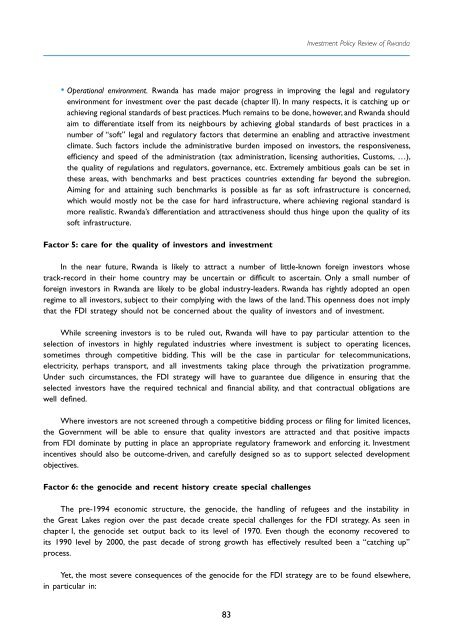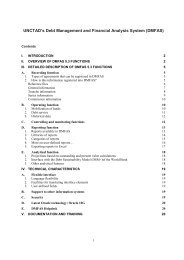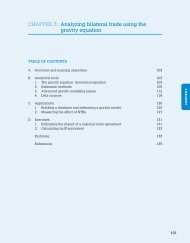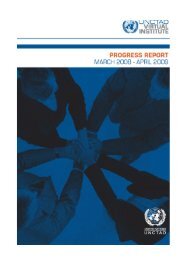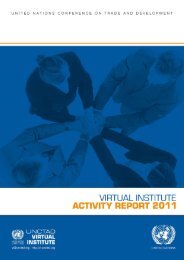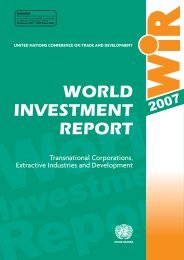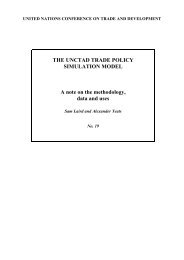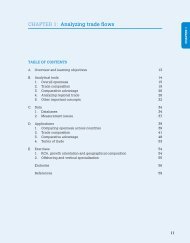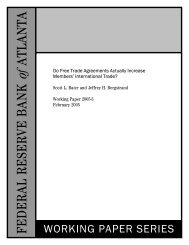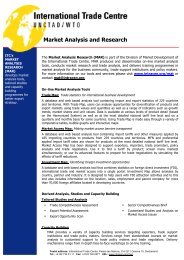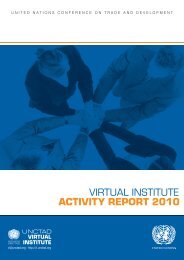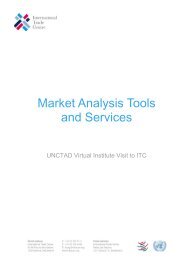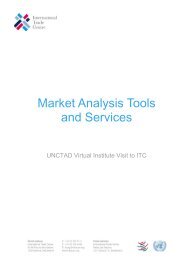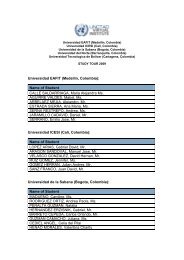Investment Policy Review - Rwanda - UNCTAD Virtual Institute
Investment Policy Review - Rwanda - UNCTAD Virtual Institute
Investment Policy Review - Rwanda - UNCTAD Virtual Institute
You also want an ePaper? Increase the reach of your titles
YUMPU automatically turns print PDFs into web optimized ePapers that Google loves.
<strong>Investment</strong> <strong>Policy</strong> <strong>Review</strong> of <strong>Rwanda</strong><br />
• Operational environment. <strong>Rwanda</strong> has made major progress in improving the legal and regulatory<br />
environment for investment over the past decade (chapter II). In many respects, it is catching up or<br />
achieving regional standards of best practices. Much remains to be done, however, and <strong>Rwanda</strong> should<br />
aim to differentiate itself from its neighbours by achieving global standards of best practices in a<br />
number of “soft” legal and regulatory factors that determine an enabling and attractive investment<br />
climate. Such factors include the administrative burden imposed on investors, the responsiveness,<br />
efficiency and speed of the administration (tax administration, licensing authorities, Customs, …),<br />
the quality of regulations and regulators, governance, etc. Extremely ambitious goals can be set in<br />
these areas, with benchmarks and best practices countries extending far beyond the subregion.<br />
Aiming for and attaining such benchmarks is possible as far as soft infrastructure is concerned,<br />
which would mostly not be the case for hard infrastructure, where achieving regional standard is<br />
more realistic. <strong>Rwanda</strong>’s differentiation and attractiveness should thus hinge upon the quality of its<br />
soft infrastructure.<br />
Factor 5: care for the quality of investors and investment<br />
In the near future, <strong>Rwanda</strong> is likely to attract a number of little-known foreign investors whose<br />
track-record in their home country may be uncertain or difficult to ascertain. Only a small number of<br />
foreign investors in <strong>Rwanda</strong> are likely to be global industry-leaders. <strong>Rwanda</strong> has rightly adopted an open<br />
regime to all investors, subject to their complying with the laws of the land. This openness does not imply<br />
that the FDI strategy should not be concerned about the quality of investors and of investment.<br />
While screening investors is to be ruled out, <strong>Rwanda</strong> will have to pay particular attention to the<br />
selection of investors in highly regulated industries where investment is subject to operating licences,<br />
sometimes through competitive bidding. This will be the case in particular for telecommunications,<br />
electricity, perhaps transport, and all investments taking place through the privatization programme.<br />
Under such circumstances, the FDI strategy will have to guarantee due diligence in ensuring that the<br />
selected investors have the required technical and financial ability, and that contractual obligations are<br />
well defined.<br />
Where investors are not screened through a competitive bidding process or filing for limited licences,<br />
the Government will be able to ensure that quality investors are attracted and that positive impacts<br />
from FDI dominate by putting in place an appropriate regulatory framework and enforcing it. <strong>Investment</strong><br />
incentives should also be outcome-driven, and carefully designed so as to support selected development<br />
objectives.<br />
Factor 6: the genocide and recent history create special challenges<br />
The pre-1994 economic structure, the genocide, the handling of refugees and the instability in<br />
the Great Lakes region over the past decade create special challenges for the FDI strategy. As seen in<br />
chapter I, the genocide set output back to its level of 1970. Even though the economy recovered to<br />
its 1990 level by 2000, the past decade of strong growth has effectively resulted been a “catching up”<br />
process.<br />
Yet, the most severe consequences of the genocide for the FDI strategy are to be found elsewhere,<br />
in particular in:<br />
83


